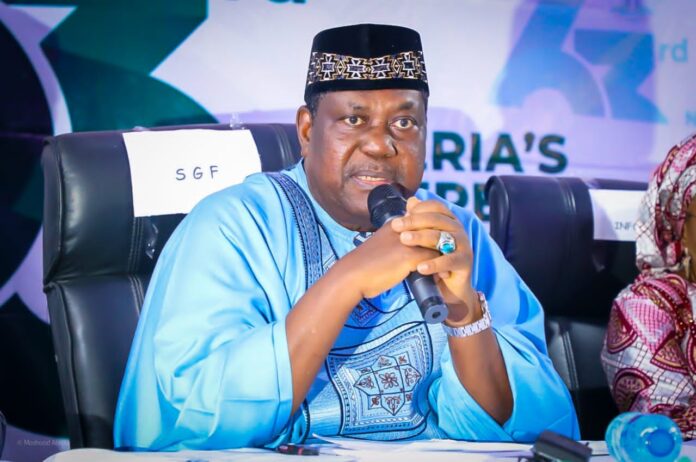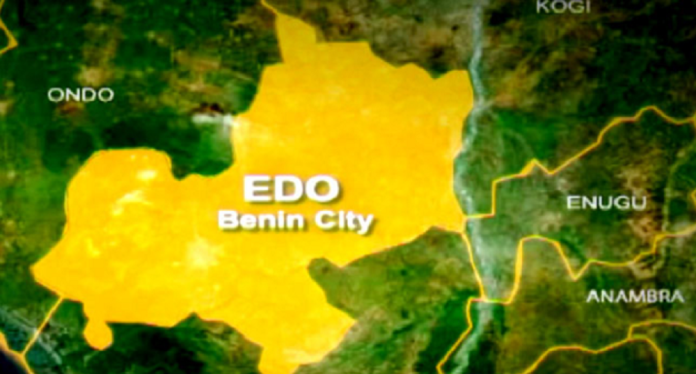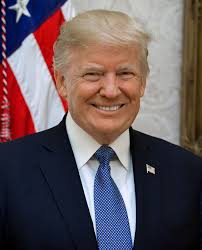Federal government has expressed its readiness to prioritise made-in-Nigeria products, to boost the nation’s self-reliance using the Renewed Hope Nigeria First Policy.
Secretary to the Government of the Federation, SGF, George Akume, disclosed this yesterday when he visited Governor Alex Otti of Abia State in Nvosi, Isiala Ngwa South Local Government Area.
Akume said: “Yesterday, government approved a new economic policy, called the Renewed Hope Nigeria First Policy.
“It is going to be an executive order to ensure that we place Nigeria first.
“So, we are going to give emphasis to products that are manufactured locally.”
According to the SGF, the move would benefit Nigeria’s industrious communities such as the people of Abia, who “will soon be laughing to the bank.”
Akume also praised the performance of the Nigeria Extractive Industries Transparency Initiative, NEITI.
He described NEITI as a “sensitive and strategic agency” monitored not just domestically, but also internationally, including from its global headquarters in Oslo, Norway.
On economic reforms, Akume said the removal of fuel subsidy was a necessary step to end a “massive scam” that had become “uncontrollable, like a wounded lion”.
He said: “A few weeks ago, Professor Benedict Oramah, President of the African Export-Import Bank, applauded what the government had done.
“Oramah was quoted as saying that this is the best decision taken by the federal government in the oil and gas industry.
“Oramah said indeed, it is bad business for Nigeria to be selling crude and at the same time, lacking money to pay for imported petroleum products into the country.”
Akume added that before subsidy removal, Nigeria had reached its borrowing limit with traditional banks, prompting the African Export-Import Bank to step in with credit support.
The SGF also noted that subsidy removal freed up more funds for state and local governments to carry out development initiatives.
He assured Nigerians of the federal government’s commitment to infrastructural development.
Akume said the Calabar–Lagos Superhighway Project would not be limited to coastal areas, but would extend inland to benefit more states.
He added that similar projects, such as the Sokoto–Badagry Superhighway, formed part of the federal government’s broader strategy to open up the country and boost economic growth.
Responding, Governor Otti urged public officials to remain focused on governance, in spite of rising criticisms from opposition voices less than two years after the 2023 elections.
“Well, in politics, you expect things like that. My approach is to just ignore the noise and continue to focus on delivering the goods,” he said.
Otti emphasised the difficulty of certain policy decisions, urging leaders to prioritise long-term benefits over short-term popularity.
“Sometimes, the immediate outcomes may be difficult, but I have never seen anywhere where omelettes are made without breaking eggs,” he said.
On fuel subsidy removal, he reiterated his longstanding position, dating back to his writings in ThisDay Newspaper’s ‘Outside the Box’ column.
“I have written extensively about subsidy removal, as far back as 2016, 2017, and we should have done it,” he said.
He said the unique opportunity to remove subsidy presented during COVID-19, when global oil prices collapsed and countries were practically giving oil away.
“Countries who had oil were begging people to come and evacuate it, even without paying for it,” Otti said.
He maintained that subsidies must be properly directed to avoid long-term economic harm.
“Subsidies are good, but then, it depends on where the subsidy is going.
“If you are subsidising production, that is very good but whenever you start subsidising consumption, you are distorting your economy,” the governor warned.
He cautioned against avoiding difficult decisions, because of the severe consequences it could have on the system.
“If you don’t think you need to take the pain of taking difficult decisions, then what you may see is an economic crisis, but we don’t pray for that,” Otti said.
Otti also commended NEITI’s commitment to transparency and accountability in governance, describing it as vital to democratic health. NAN











